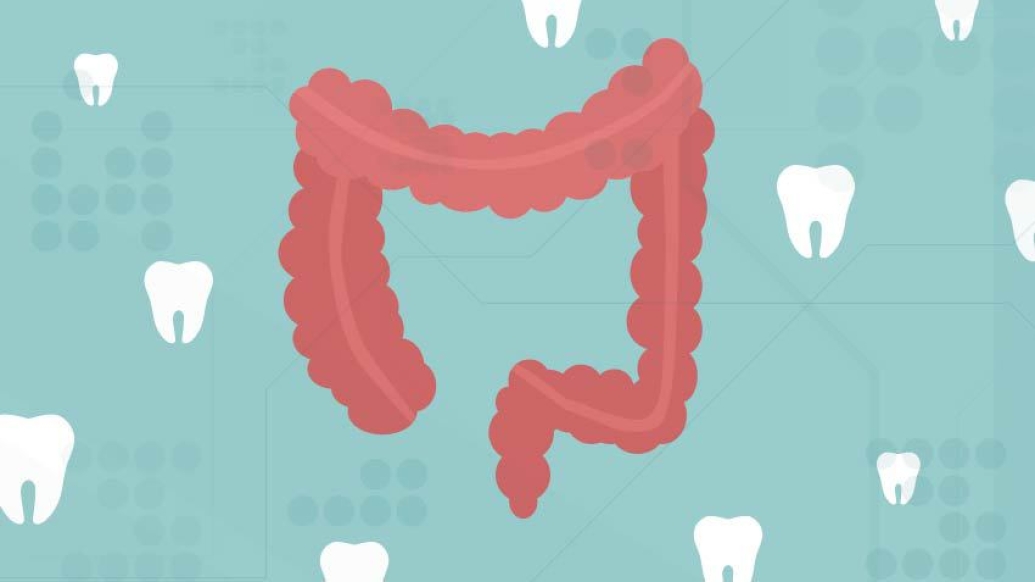A new study describes how poor oral health may worsen gut inflammation.
11:29 AM
Author |

While many people put off their regular trips to the dentist, recent research has shown that the consequences of doing so may go beyond cavities and root canals. From heart disease to diabetes, poor oral health is often a reflection of a person's overall health and may even be the cause of systemic disease.
A new collaborative study from the U-M Medical and Dental Schools reveals that inflammatory bowel disease (IBD), which included Crohn's disease and ulcerative colitis and afflicts an estimated 3 million adults in the U.S., may be the latest condition made worse by poor oral health.
Nobuhiko Kamada, Ph.D., assistant professor of internal medicine in the division of gastroenterology, has been studying the gut microbiome—the collection of bacteria that are normally present in the gut— for years. He noted an emerging link in research literature between an overgrowth of foreign bacterial species in the guts of people with IBD—bacteria that are normally found in the mouth. "I decided to approach the dental school to ask the question, does oral disease affect the severity of gastrointestinal diseases?" says Kamada.
The new mouse study, published in Cell, shows two pathways by which oral bacteria appear to worsen gut inflammation.
In the first pathway, periodontitis, the scientific name for gum disease, leads to an imbalance in the normal healthy microbiome found in the mouth, with an increase of bacteria that cause inflammation. These disease-causing bacteria then travel to the gut.
However, this alone may not be enough to set off gut inflammation. The team demonstrated that oral bacteria may aggravate gut inflammation by looking at microbiome changes in mice with inflamed colons.
MORE FROM THE LAB: Subscribe to our weekly newsletter
"The normal gut microbiome resists colonization by exogenous, or foreign, bacteria," says Kamada. "However, in mice with IBD, the healthy gut bacteria are disrupted, weakening their ability to resist disease-causing bacteria from the mouth." The team found that mice with both oral and gut inflammation had significantly increased weight loss and more disease activity.
In the second proposed pathway, periodontitis activates the immune system's T cells in the mouth. These mouth T cells travel to the gut where they, too, exacerbate inflammation. The gut's normal microbiome is held in balance by the action of inflammatory and regulatory T cells that are fine-tuned to tolerate the resident bacteria. But, says Kamada, oral inflammation generates mostly inflammatory T cells that migrate to the gut, where they, removed from their normal environment, end up triggering the gut's immune response, worsening disease.
"This exacerbation of gut inflammation driven by oral organisms that migrate to the gut has important ramifications in emphasizing to patients the critical need to promote oral health as a part of total body health and wellbeing," says co-author William Giannobile, DDS, the William K and Mary Anne Najjar professor of dentistry and chair of the department of periodontics and oral medicine at the U-M School of Dentistry.
The study has implications for novel treatments for IBD, necessary because "far too many patients still fail medications, leading to reduced quality of life and eventual surgery," says study co-author Shrinivas Bishu, M.D., assistant professor of gastroenterology. "This study importantly implies that clinical outcomes in IBD may be improved by monitoring oral inflammation – an intriguing concept."
Paper cited: "The intermucosal connection between the mouth and gut in commensal pathobiont-driven colitis," Cell. DOI: 10.1016/j.cell.2020.05.048
Like Podcasts? Add the Michigan Medicine News Break to your Alexa-enabled device or subscribe for updates on iTunes, Google Play and Stitcher.

Explore a variety of health care news & stories by visiting the Health Lab home page for more articles.

Department of Communication at Michigan Medicine
Want top health & research news weekly? Sign up for Health Lab’s newsletters today!





